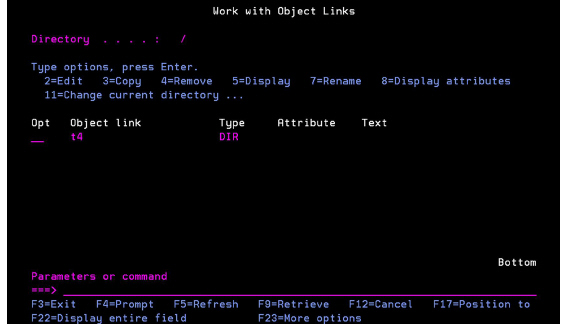
Reviewing and Retrieving the XML file
Note: This information is provided for states requiring submission of the quarterly filing in XML format. Please refer to your state requirements.
1. From an AS/400 command line, type and enter the following command corresponding to your state.
Florida - WRKLNK FL
Canada - WRKLINK T4
New Mexico - WRKLINK NM
Note: The examples shown in this section are Canadian files
Reviewing the XML document on the iSeries (AS/400) screen
2. Enter 5 on the Opt line and press ENTER to display the directory contents.
Note: The generated XML Document begins with the prefix (FL for Florida, T4 for Canada, or NM for New Mexico) followed by the time and date the file was created, in hh:mm:ss:mm:dd:yy format. Each time an XML file is generated, a new file is created.
3. Display the file for review by entering another 5 on the Opt line. Review the file for accuracy. From this screen you can also chose to edit the file by typing a 2 next to the file name on the Opt line.
4. After you have verified the accuracy of the XML file, you can save the document to your desktop. The XML Document can then be edited or, if desired, emailed.
Retrieving the XML document on your PC
1. Open the AS/400 (iSeries) Navigator.
2. Click the + next to your AS/400 (iSeries) system to expand the selection.
Expanded iSeries system screen
3. Click the + next to File Systems to expand the selection.
4. Click the + next to Integrated File System to expand the selection.
Expanded Integrated File system screen
5. Click the + next to Root to expand the selection.
6. Click the appropriate folder to display the XML file corresponding to your state.
Florida - FL
Canada - T4
New Mexico - NM
Note: The generated XML document begins with the prefix followed by the time and date the file was created, in hh:mm:ss:mm:dd:yy format. Each time an XML file is generated, a new file is created.
You may now either drag or copy the document to your desktop, and attach it in an email.
Editing the XML document
After you have copied the document to your desktop, you can display it (or edit it if needed) using Notepad. Merely right-click the file, and select Edit with Notepad. Make changes as needed, and save the file.